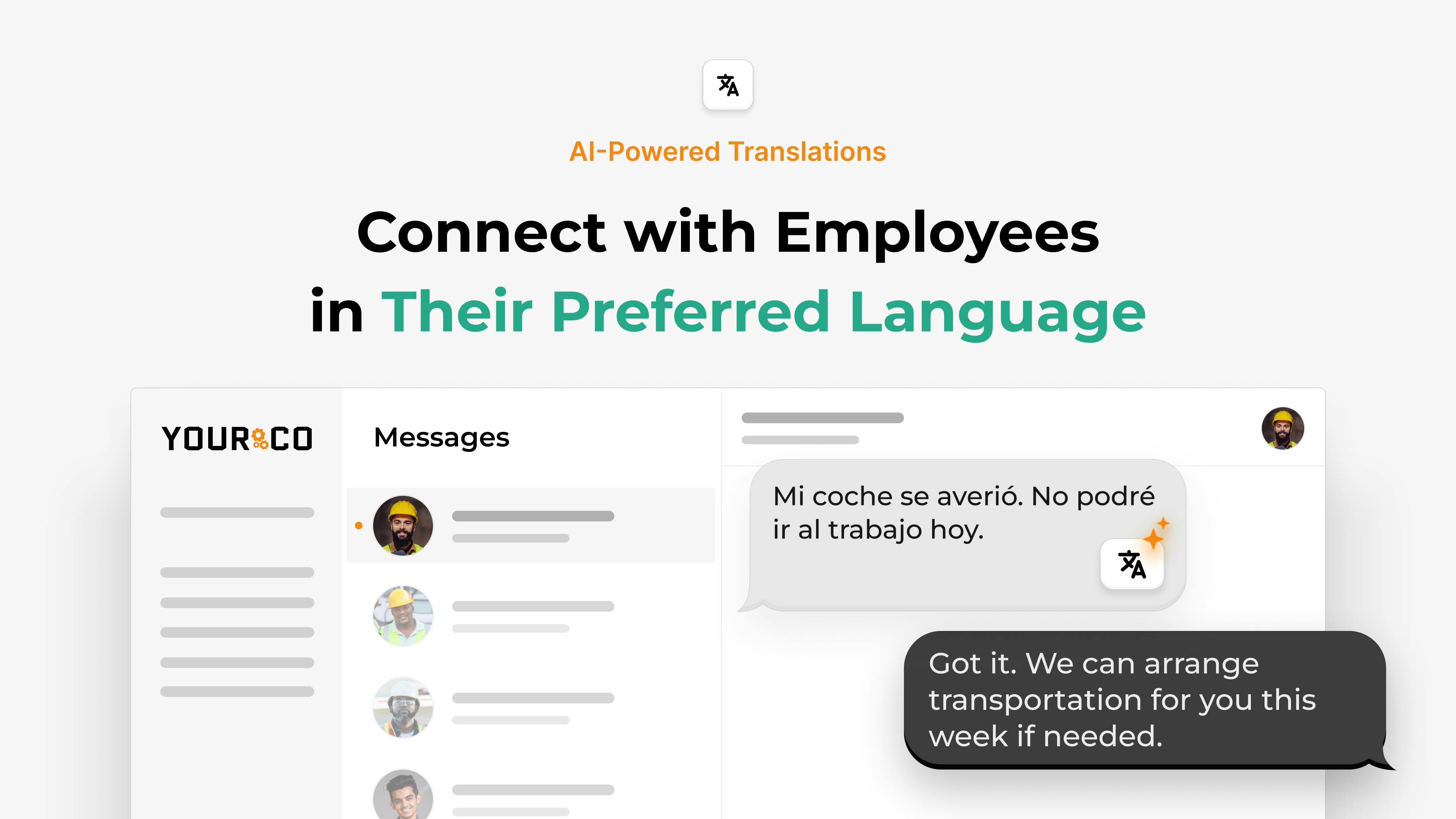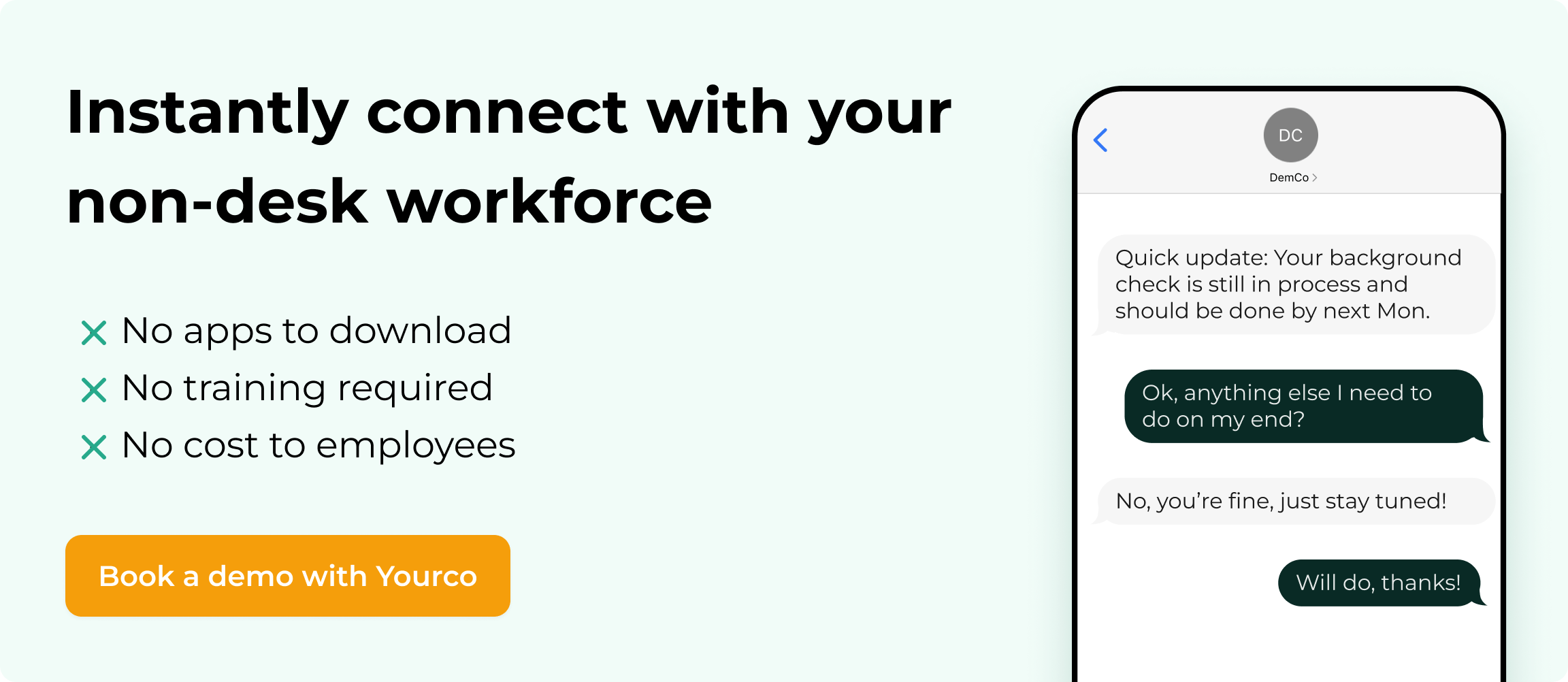Benefits of Streamlined Employee Call-Off Systems in Hospitality and Restaurant Groups


The cost of absenteeism to business in the hospitality and restaurant groups runs deep, from scrambling to find last-minute coverage to paying overtime when shifts go unfilled. A streamlined employee call-off system gives managers the visibility and speed they need to reduce employee absenteeism, control costs, and keep operations running smoothly.
TL;DR
- Traditional call-off methods like voicemails and personal texts create delays, missed messages, and poor documentation
- A streamlined call-off system gives managers instant visibility into absences, with more time to find coverage
- Faster response times reduce overtime costs and prevent understaffed shifts that hurt the guest experience
- Centralized, timestamped records protect managers and support fair attendance tracking
- SMS-based systems work for every employee, including those without smartphones, apps, or email access
- Platforms like Yourco turn call-offs into actionable frontline intelligence by revealing absence patterns and operational risks over time
Learn Why Traditional Call-Off Methods Fall Short
Most hospitality and restaurant teams still rely on a patchwork of voicemails and phone trees to manage call-offs. These methods worked well enough when operations were simpler, but they create serious gaps in today's fast-paced, multi-location environments. Here's why these traditional approaches consistently fail:
- Voicemail creates dangerous delays: Messages pile up and get checked late, especially during peak hours. There's no timestamp trail managers can reference later, and no way to quickly forward information to schedulers or HR.
- Phone trees garble information: Details get lost or changed as they pass from person to person. By the time the right manager hears about an absence, there's no time left to find coverage.
- Group chats bury critical notices: Important call-off messages get drowned out by casual conversation. Managers can't easily track who reported what, and there's no clean documentation for HR or compliance purposes.
- Email doesn't reach frontline workers: Most hospitality employees don't have company email addresses or check email regularly. Messages sent at 5 a.m. might not be seen until it's too late to act.
- Verbal relay through coworkers is unreliable: Asking a coworker to pass along the message creates a game of telephone. Details get lost, the message arrives late, and there's no record that the employee ever reported the absence.
SMS solves these problems because it meets employees where they already are. Unlike email or dedicated apps, text messaging works on any phone, including basic flip phones, and doesn't require downloads, logins, or a company email address. Studies consistently show that text messages achieve 98% read rates, with most opened within minutes of delivery.
For hospitality teams where shifts start early, end late, and change constantly, SMS provides the speed and reliability that voicemails and phone trees simply can't match. It's a channel every employee already knows how to use, which means no training, no adoption hurdles, and no excuses for missed messages.
Understand the Key Benefits of a Streamlined Call-Off System
A dedicated call-off system replaces scattered communication with a single, reliable process. When employees have one clear way to report absences and managers get instant alerts, the entire operation runs more smoothly. Here's how a streamlined system delivers measurable workforce communication ROI.
Faster Response Times Mean Better Coverage
Every minute counts when you're trying to fill an open shift. A streamlined call-off system sends instant notifications to supervisors, schedulers, and HR the moment an employee reports an absence. Instead of discovering a gap when the shift is about to start, managers get hours of lead time to find coverage. That extra buffer is often the difference between a fully staffed service and a short-handed scramble that hurts the guest experience.
Clear Documentation Protects Your Team
When call-offs live in voicemails and personal texts, tracking attendance patterns becomes nearly impossible. A centralized system creates timestamped records for every absence, making it easy to spot trends and have fair, fact-based conversations about attendance. This documentation also protects managers during disputes, ensuring there's a clear paper trail if questions arise about who reported what and when.
Reduced Manager Workload Frees Up Time for Operations
Hospitality and restaurant managers already juggle inventory, training, guest issues, and a dozen other priorities. Chasing down voicemails and deciphering late-night texts shouldn't be on that list. A streamlined call-off system eliminates the manual follow-up and phone tag that eats into productive hours. Managers can check a single dashboard instead of scrolling through multiple inboxes, giving them more time to focus on what actually moves the business forward.
Improved Employee Accountability Reduces No-Shows
When calling off is as simple as sending a quick text to a dedicated number, employees lose the excuses. No more "I couldn't get through" or "I left a voicemail but no one called back." A consistent, easy-to-use process makes it clear what's expected and removes the friction that sometimes leads employees to skip reporting altogether. The result is fewer no-shows and a more reliable team overall.
Better Labor Cost Control Through Visibility
Unplanned absences don't just disrupt service. They drive up costs. When managers get last-minute notice about a call-off, their only option is often paying overtime to whoever can cover. A streamlined system supports labor cost control by providing earlier notice and better data on absence patterns. With clearer visibility, managers can plan smarter and reduce the overtime cost reduction opportunities that come from reactive scheduling.
Stronger Communication with Multilingual Teams
Hospitality teams are often diverse, with employees speaking Spanish, Mandarin, Vietnamese, and dozens of other languages. Traditional call-off methods assume everyone communicates the same way, which leads to confusion and missed messages. A modern call-off system that supports multiple languages ensures every team member understands the process and can report absences clearly, regardless of their primary language.
Works for Every Employee, Regardless of Tech Access
Not every hospitality worker has a smartphone or reliable internet access. Some use basic flip phones. A truly streamlined call-off system works via SMS, so it reaches everyone on your team without requiring app downloads, logins, or technical know-how.
Improved Guest Experience Through Consistent Staffing
Guests feel the impact of staffing gaps immediately. When shifts are filled quickly and service teams stay fully staffed, wait times stay short, service quality remains consistent, and employees aren’t stretched thin trying to cover multiple roles. A streamlined call-off system helps protect the guest experience by preventing the service breakdowns that happen when staffing issues go unnoticed until the last minute.
Streamline Call-Off Communication with Yourco
Call-offs will always be part of hospitality and restaurant operations. What makes the difference is how quickly you hear about them, how clearly they’re documented, and what you can do with that information once it’s in one place. A streamlined call-off system replaces missed voicemails and scattered texts with a process managers can trust, even at 5 a.m. on a busy weekend.
With Yourco, hospitality and restaurant groups get a call-off system designed for real-world operations:
- SMS-based call-off reporting that works on any phone, including flip phones, with no apps, logins, or email required
- Instant alerts to managers and schedulers the moment an employee reports an absence
- Centralized, timestamped documentation for every call-off, supporting fair attendance tracking and dispute protection
- Dedicated company numbers that keep call-offs out of managers’ personal phones
- Multilingual support so employees can report absences clearly in their preferred language
- Multi-location visibility that shows call-off patterns by site, role, and shift
- Frontline Intelligence that surfaces trends like repeat absences, coverage gaps, and early signs of burnout
Together, these features turn call-offs from last-minute disruptions into clear, actionable signals. Managers spend less time scrambling, labor costs stay under control, and teams stay staffed in ways guests actually notice.
Teams using Yourco see real engagement gains fast. After 90 days, two-way employee engagement increases to 86%, showing that when communication works on every phone and feels easy to respond to, employees actually participate.
Try Yourco for free today or schedule a demo and see the difference the right workplace communication solution can make in your company.
Frequently Asked Questions
What is a streamlined call-off system in hospitality?
A streamlined call-off system gives employees one clear way to report absences and routes those messages instantly to the right managers. Instead of juggling voicemails, texts, and phone calls, all call-offs are logged in one place with timestamps and visibility across shifts and locations.
How does a call-off system reduce labor costs?
Earlier notice gives managers time to fill shifts without defaulting to overtime. Over time, clear call-off data also helps leaders spot patterns like chronic understaffing or burnout, which supports better scheduling decisions and more predictable labor spend.
Why is SMS better than phone calls or email for call-offs?
SMS messages are read within minutes and work on any phone, including basic flip phones. Employees don’t need apps, logins, or company email addresses, which removes friction and reduces the chance of missed or unreported absences.
How does documentation help managers and HR teams?
Centralized, timestamped records create a clear history of who reported an absence and when. This supports fair attendance conversations, protects managers during disputes, and simplifies reporting for HR and operations teams.
How does Yourco support call-off management at scale?
Yourco uses SMS-based call-off workflows that reach every employee and alert managers instantly. Beyond handling absences in real time, Yourco turns call-off messages into narrative frontline intelligence, helping leaders identify trends like repeat no-shows, coverage gaps, or early signs of burnout across locations.





